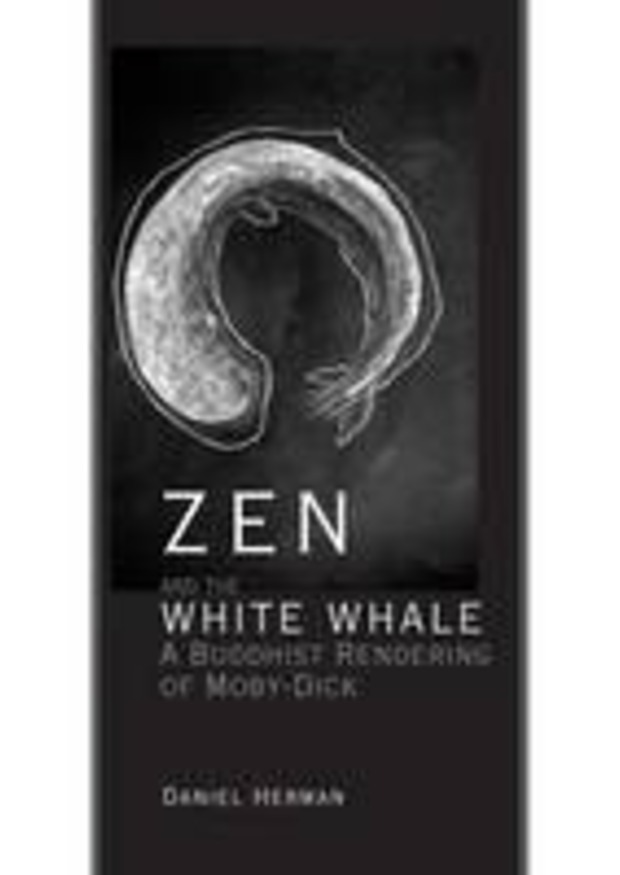A Buddhist Rendering of Moby-Dick
In Moby-Dick’s wide philosophical musings and central narrative arch, Daniel Herman finds a philosophy very closely aligned specifically with the original teachings of Zen Buddhism. In exploring the likelihood of this hitherto undiscovered influence, Herman looks at works Melville is either known to have read or that there is a strong likelihood of his having come across, as well as offering a more expansive consideration of Moby-Dick from a Zen Buddhist perspective, as it is expressed in both ancient and modern teachings. But not only does the book delve deeply into one of the few aspects of Moby-Dick’s construction left unexplored by scholars, it also conceives of an entirely new way of reading the greatest of American books—offering critical re-considerations of many of its most crucial and contentious issues, while focusing on what Melville has to teach us about coping with adversity, respecting ideological diversity, and living skillfully in a fickle, slippery world.
Reviews:
Trying to catch Moby Dick the whale, like catching Melville’s novel, can be a frustrating and often self-defeating quest. It is not simply the foundational great American novel (see Lawrence Buell’s 2014 work, The Dream of the Great American Novel) but a text that cannot be contained by any geographic, disciplinary, or ideological boundaries. Yet, Daniel Herman has caught it (or come as close as possible to catching it) in simply one of the most imaginative, creative, and fascinating academic works I have read in years.
--Peter Admirand, Dublin City University
Daniel Herman, a professor of American literature and a longtime practitioner of Soto Zen, offers yet another perspective in Zen and the White Whale. Noting that there has so far been no ‘thorough investigation of the parallels with Zen philosophy that exist in Moby-Dick,’ Herman endeavors to fill that gap by examining the principal characters, scenes, and themes of Moby-Dick through the lens of Zen teachings. Focusing first on the biographical and historical contexts of the novel and subsequently on the text itself, Herman calls attention to thematic elements that resonate with Zen teachings. . . .Along the way, Herman also provides concise explanations of central Buddhist themes such as impermanence, interdependence, and dependent co-origination, integrating these themes concretely with scenes and situations from the novel. . . .Herman’s pioneering, discerning, and engrossing study of Moby-Dick might well be a model for future studies of Western fiction from the perspective of Zen teachings.
--Buddhadharma
Moby-Dick is as vast and wonderful as the whale itself, and like the animal, it admits of many interpretations. I was not at all surprised when I read Daniel Herman's extraordinary investigation into the spiritual life of this eternally intriguing and ineffable book. His 'hyper-thesis' is almost as endlessly interesting; looking at the numinous and the ethical quandaries of Melville's work through a Buddhist lens, he provides us with a vital new view of at the novel, aptly and empathetically reappraised, for the twenty-first century.
--Philip Hoare, The Whale and The Sea Inside
Daniel Herman presents an original and convincing interpretation of Moby-Dick as responsive to, and resonant with, Buddhist teachings. No other book in English pursues the parallels between Melville’s greatest novel and Buddhism so thoroughly or perceptively. This bold and creative book makes a valuable contribution to Melville studies.
--Dawn Coleman, University of Tennessee, Knoxville
In Zen and the White Whale, Daniel Herman accomplishes three crucial objectives: he unfolds the historical context for understanding Melville’s encounter with Buddhism, as understood in nineteenth-century accounts of it; he performs a thorough and elegant reading of Moby-Dick as a Zen meditation; and finally he models a form of criticism inspired by Buddhism, implicitly re-aligning traditional Western ways of reading in favor of something more fluid, open, and receptive. As a 'Buddhist rendering,' this book refines Melville’s metaphysical blubber into new and subtle oil.
--Wyn Kelley, author of Melville's City and Herman Melville: An Introduction
Melville scholars have long been fascinated and challenged by just how deeply the author of Moby-Dick pondered and drew on the traditions of Buddhism. Certainly none have worked that vein with the knowledge and alert commitment Daniel Herman now brings to the question. Zen and the White Whale compellingly, deftly, and wittily argues Buddhism close to the center of Melville's imaginative span.
--Vincent O'Sullivan, Victoria University of Wellington
In his lucid meditations on Zen and the art of Moby-Dick, Daniel Herman shows how Buddhist thought circulated in Melville’s time and then illuminates the philosophical experiences of the Pequod’s crew in the light of the wisdom of the Zen masters. Herman’s generative readings tries out Moby-Dick as a koan that distills profound lessons about the perils of confronting the groundlessness of life. Herman charts how Ishmael’s whaling quests awaken him to 'a vivacious embrace of a centerless life on the margins,' dramatizing to readers a buoyant detachment through a sustaining connection with what Melville calls the 'all-contributive and all-receptive' ocean.
--Timothy Marr, University of North Carolina, Chapel Hill
I have been traveling on the ocean for a long time, yearning to sight and closely encounter the great whale. Now with the aid of Daniel Herman’s brilliant work I have finally met the whale and looked into the whale’s eye, so calm and quiet, and have thereby more deeply shared and understood the struggles and enlightenment of Herman Melville.
--Tenshin Reb Anderson, Former Abbot, San Francisco Zen Center













